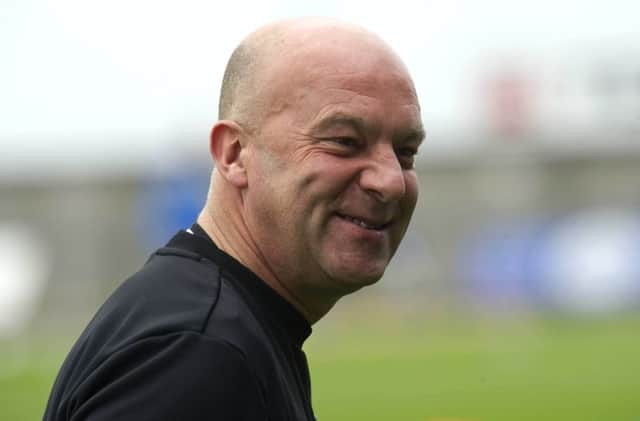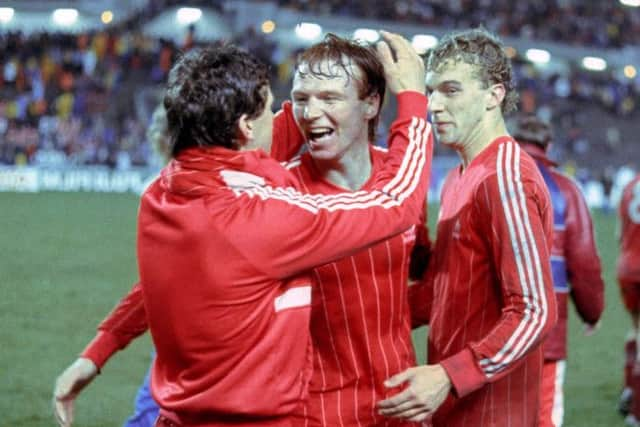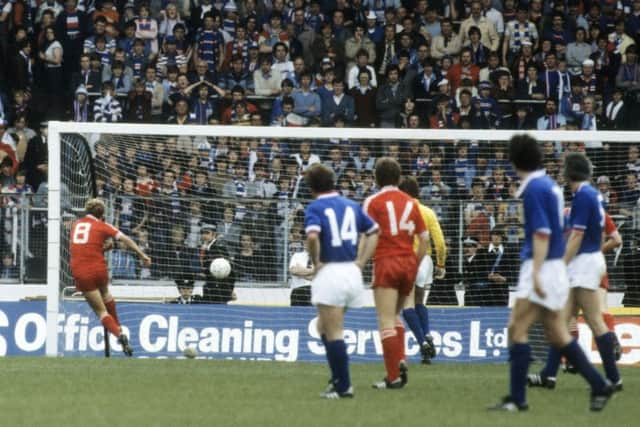Interview: Neale Cooper on playing for Aberdeen and Rangers


Cooper laughs as he remembers when those curls disrupted the start of pre-season training. “Bryan Gunn and I had been on holiday to Ibiza. It was the time of Wham! so we decided to put peroxide in our hair and the sun turned mine pure white. Fergie said: ‘Cooper, what’s that on your head?’ He yanked at my hair – he thought I was wearing a wig. Then he ordered me to the nearest hairdresser. I had to darken the colour before he’d let me back in.”
Now Cooper, 52, has nothing on his head. The curls have gone but the sense of fun from his Pittodrie pomp hasn’t. As the hype builds for Aberdeen’s clash with Rangers tomorrow, reactivating one of Scottish football’s most nuclear rivalries, he’s a good man with whom to have a natter, not least for the perspective that it’s only a game. Of course he played for both clubs.
Advertisement
Hide AdAdvertisement
Hide Ad“Some people are surprised when they meet me for the first time,” he says, sipping his tea in an Aberdeen hotel. “They can actually be quite scared of me but then they see that I’m pretty happy-go-lucky. I think they expect me to be this tough nut because of how I played. That was simply me doing a job of work when I crossed the white line. You know, laughter’s been important to me. It’s brought me quite far in life.”


Cooper is only too well aware that, having first been a Gothenburg hero for the Dons and later switching to Ibrox he’s contributed to some of the enmity, and we might as well get his debut in the light blue out of the way right now. After winning two Premier League titles, four Scottish Cups and a League Cup as well as the Cup Winners’ Cup with Aberdeen, the team was breaking up and he fancied a change of scene. Plus, as one half of Fergie’s midfield-enforcer unit with Neil Simpson, he’d become fairly notorious. “I thought Scotland’s referees deserved a break from me.” But his move to Aston Villa was blighted by injuries and then Graeme Souness gave him a call.
“Of course I thought: ‘Can I do this? Can I actually play for Rangers?’ They’re the club Aberdeen fans dislike the most. But I wasn’t wanted at Villa and here was a chance to play with some great players – Terry Butcher, Trevor Steven, Butch Wilkins, Mark Walters. I was to be a squad player, which was fine.”
But right away he was needed – against Aberdeen at Pittodrie, wouldn’t you know. “I had to drive the boss there. Graeme left his car in Dundee, a beautiful Jaguar. He got in my Montego Mayfair, not the best, and said: ‘Wow, you’ve done well out of us.’ Halfway up the road he was like: ‘Does it go a bit faster?’
“I was slaughtered by the Aberdeen fans during the warm-up. They called me a ‘turncoat’ and worse. I understood why; I’m a big boy. I suppose it was a bit like an oil executive in this town moving from BP to Shell. Actually, scrub that. It was far, far worse.”


Cooper scored a screamer. “I was accused of over-celebrating but I’d taken so much abuse.” Butcher was sent off, kicking the away changing-room door, and the stud-marks remain to this day. Our man, out of habit, entered the wrong door at half-time and found himself surrounded by Aberdeen players. “Quite rightly they told me to get to f***’.” But the match is remembered for a tackle by Simpson on Ian Durrant which left the latter unable to play for three years, during which he sued his opponent.
“I don’t talk about what happened,” Cooper says quietly. “There was an atmosphere that day and I know me changing sides was part of it. It was a hard game. Both guys suffered massively. They’re my friends and I’m really close to the two of them. Ian’s a great pal, one of the best I’ve played with, such a wonderful guy. Simmy was my playing partner and is a long-time friend. That wasn’t a nice day for anyone.”
It didn’t quite end there for Cooper. He stayed in the Granite City to have a drink with some old pals. “I went to the loo and was followed by a couple of guys who looked a bit dodgy. Behind the door of the cubicle I could here them saying: ‘He’s in that one – let’s get him’. Thankfully my friends had seen them come after me and chased them away.”
Advertisement
Hide AdAdvertisement
Hide AdWe’ll return to Aberdeen vs Rangers but first some of Cooper’s fascinating, funny, sad backstory. His passport has the exotic birthplace of Darjeeling, India, his father Douglas having managed a tea plantation. “Dad loved it in India and was there 16 years. But then there was a bit of trouble with the Indians wanting to take back control – it’s their country – so the family came to Aberdeen. We bought a house in Airyhall and Dad got a lovely wee shop, a post office-cum-deli, but then he dropped down dead – a massive heart attack at 39.”


Cooper turned up at the primary in Airyhall speaking only Hindu. “This must have confused some of the other parents when they got told: ‘An Indian boy joined our school today – he’s got blond hair’. I remember everyone in my class having to say where they’re born. ‘Darjeeling’, I said. ‘Where’s that?’ ‘Oh, it’s a village in the country… near Fraserburgh’.
“I didn’t have a father in my life and was always aware of that. ‘Dad would like to have been here today’, I’d say to myself after some good Aberdeen performances. The worst, also the best, was Gothenburg. I had a moment to myself in the changing room that night. I’m quite an emotional person. People are surprised.”
He thinks his life after that could have gone “either way”. By that he means a good way or a bad way. That it followed a good path is down, he says, to his mum Anne and older sister Shirley, though he benefited from some key mentors.
“Ernie Youngston, the janitor, saw me kick a ball about the field on my own when I was six or seven,” he recalls. “He was great. He encouraged me, put me in the school team and became like a second father to me. Then he took me to meet another great man – [legendary Pittodrie coach among other things] Teddy Scott. ‘I think this boy may have something, Teddy’, Ernie said. In the school holidays Teddy would take me down to training in his van and I’d help him with the balls and the cones.”


At 11 Cooper was playing in the district schools select alongside John Hewitt. At 14 he was lining up against guys twice his age for Aberdeen’s reserves. Then at 16 Fergie handed him his first-team debut. “I was cleaning his office on the Friday, which was part of my duties as groundstaff. He said: ‘Once you’ve done the toilets you can go’. I said I wasn’t due to finish until five o’clock. ‘Go home and get some rest. [Alex] McLeish has hurt his leg – you’re playing tomorrow’. The rest of the groundstaff didn’t believe me. My mum didn’t believe me. And when I turned up at the team hotel the next day the players just laughed.”
Cooper only made a handful of appearances in 1980-81, an unusual season without honours for the dandy Dons. But just look at where he turned up: Parkhead, Ibrox, Anfield. Fergie clearly agreed the lad “had something”. On the way to the game against Celtic, nervous but excited, the senior pros wished him good luck as he moved through the bus. “I got to [Ian] Scanlon, a funny boy. He said: ‘F****n hell, I can’t believe you’re playing, I think you’re going to have a nightmare!’ ”
He ponders the dramatic change in his circumstances at this juncture. “My life at home was with my mum and my sister. Mum had to sell the shop and go back to work as a teacher. She never re-married or had boyfriends so it was a very feminine environment. Then suddenly I’m hurled into a changing room with all these hairy-arsed footballers.”
Advertisement
Hide AdAdvertisement
Hide AdSometimes, waiting for the No 11 bus to take him to Pittodrie, Cooper would see Fergie drive past from his home in Cults. “I’d try and hide, not really wanting a lift, but often he’d spot me. Terry Wogan would be on the radio and Fergie would be singing the whole journey. Then I’d get ribbed by the guys for being the teacher’s pet.
“But I never got any preferential treatment for not having a dad. Fergie had come to the house to meet Mum and had charmed her. He obviously knew my story but at Aberdeen every kid had to grow up. I played with a lot of boys who were brilliant footballers but mentally just not tough enough for him.”
Fergie seemed to keep a paternalistic eye on this hot prospect, though, and intervened when, aged 17, his living arrangements changed. “He said: ‘Cooper, you’ve been seen coming out of a flat in Great Western Place’. ‘It’s my flat’, I said. ‘Oh is it really?’ he said. ‘Get back to your mother’s house tonight!’ The lads took the mickey out of me for that. I’d bought the flat with money left by an old auntie. Fergie’s rule about living on your own was you had to know how to feed yourself. ‘Tell me how you make soup’, he asked. I couldn’t tell him because I’d been going to Mum’s for my tea every night. I didn’t get back in that flat until I was 21.”
Adopting the low-level espionage of Jock Stein, Fergie also kept a check on the players’ nocturnal manoeuvres. “We began one season being hammered by Dundee United. He said no one was to go out that night but some of us went for a lager shandy in our usual place, Boodles Bar in the Huntly Hotel, and were like: ‘Who does he think he is?’ The rest went home to their wives and I met up with some pals at Champers, the top nightclub at the time. At training on Monday I thought I’d got away with it. I should have known better.
“‘Cooper,’ he said, ‘the physio’s room now’. He marched me into the corner and I thought he was going to whack me. ‘Did you go out on Saturday night?’ ‘No’, I said. He repeated the question and I gave the same answer. ‘One more time, you’ll be in serious trouble if you lie, did you go out on Saturday night?’ ‘Yes’. ‘And were you at a… discotheque?’ ”
Just about able to suppress his giggles, Cooper was told he’d be fined but not dropped for the League Cup tie against Berwick Rangers. “I scored and couldn’t resist doing Michael Jackson’s Moonwalk in front of Fergie and Archie Knox in the dugout. The boss was like: ‘Bloody hell, Archie, would you just look at that’.
The anecdote tells you how much Fergie valued a player who began as a most able deputy for McLeish and Willie Miller and could do a turn at right-back and, when defence wasn’t affording him enough opportunities, forced the manager to create a new role elsewhere. “He made me the holding midfielder, allowing Simmy and Dougie [Bell] to burst forward.” Der Kaiser was one of his admirers. Ahead of a Uefa Cup clash with Hamburg, Franz Beckenbauer watched Cooper deliver a precociously imperious performance at Easter Road and declared the Don the closest he’d seen to his great self. “That was very flattering,” says Cooper. Both he and team-mate Eric Black seemed especially modern footballers, guys to build a future Scotland team around. So what went wrong?
“We were overplayed and Fergie admits that. I’m wrecked now and couldn’t go for a run if I wanted. Playing golf the other day I had to use a buggy but still ended up hurting my left knee. My right knee’s knackered, I broke my sternum, my nose four times, my ankle twice and needed an operation on my back. Eric’s in so much pain with his back. If you were slightly injured you were scared to say because you’d be thought a jessie so you played anyway.”
Advertisement
Hide AdAdvertisement
Hide AdCooper moved into management, first at Ross County then in England. He wouldn’t mind another go at it but right now is happy being back in Aberdeen working for club sponsors Saltire Energy. He has three children from his marriage which ended a few years ago and is currently looking after his mum, now 89, who has never moved from the house in Airyhall where, as he says, she did such a good job of raising him.
“It’s only right I look after her now for what she did for me so maybe I should tell Fergie I’m back living at home again.” He’s laughing because he’s remembering Gothenburg. “The players could take their wives and girlfriends to the final but Fergie said to me: ‘Not you, Cooper – you’ve got a different girlfriend every week’. ‘What about if I bring my mum?’ I said. ‘Great idea’.
Cooper’s clattering of Celtic’s Charlie Nicholas just four seconds after kick-off has entered the fierce mythology. “Fergie had me hyped up all week about Charlie, who then didn’t speak to me for two years.” But it was always Aberdeen’s games against Rangers which had the most needle, the greatest edge and the highest crime count.
Double sendings-off were common in Cooper’s era. Ally Dawson and Eric Black, then Dawson again and Stewart McKimmie, Dougie Bell and Jim Bett. A clash in 1985 is described as “this appalling violent spectacle” in Aberdeen’s normally quite formal game-by-game record with Hugh Burns and Craig Paterson being the ones red-carded.
“Craig tackled me and I just about ended up in the crowd. That game was a bad one. The fans rioted on the pitch and I seemed to get blamed for everything boiling over. I did look forward to games against Rangers but sometimes they got out of hand.”
Now he must be getting back to see him mum. “Let’s hope for none of that nonsense on Sunday, just a cracking match.”